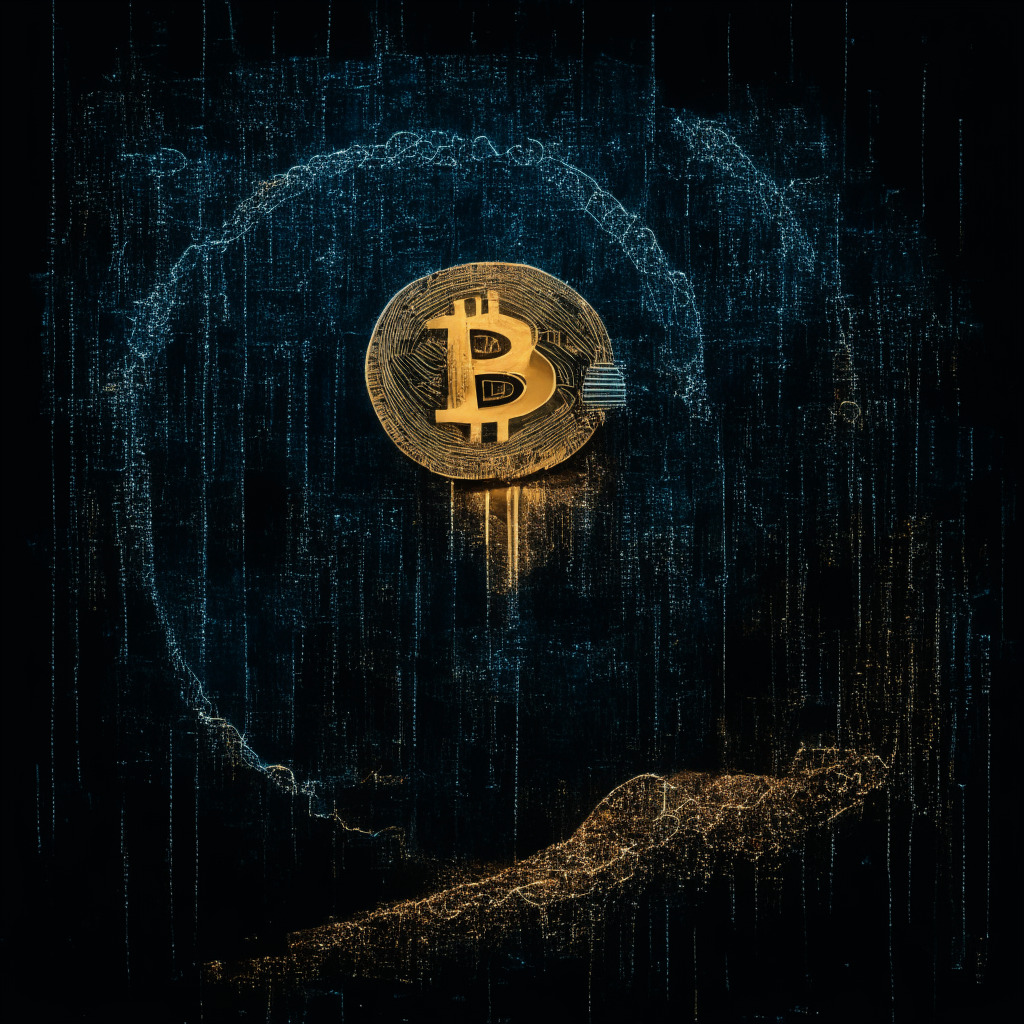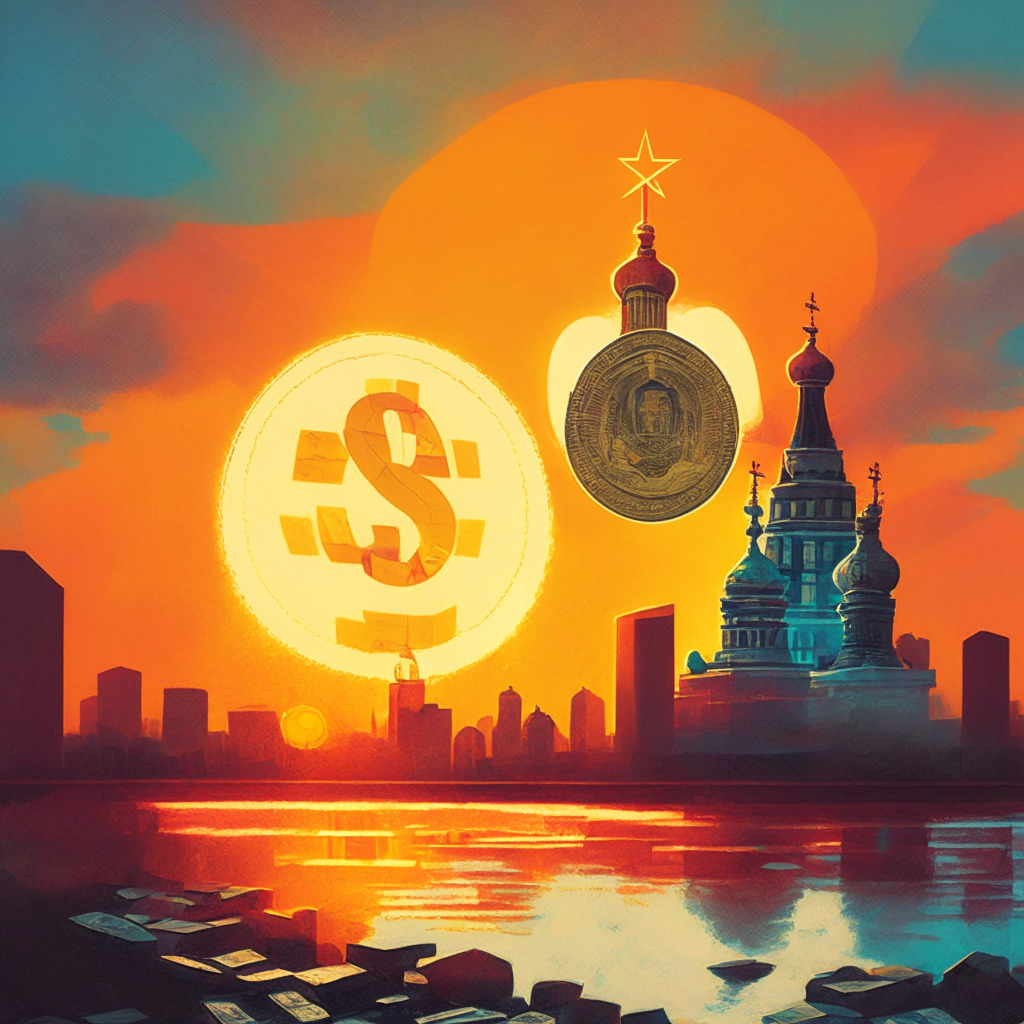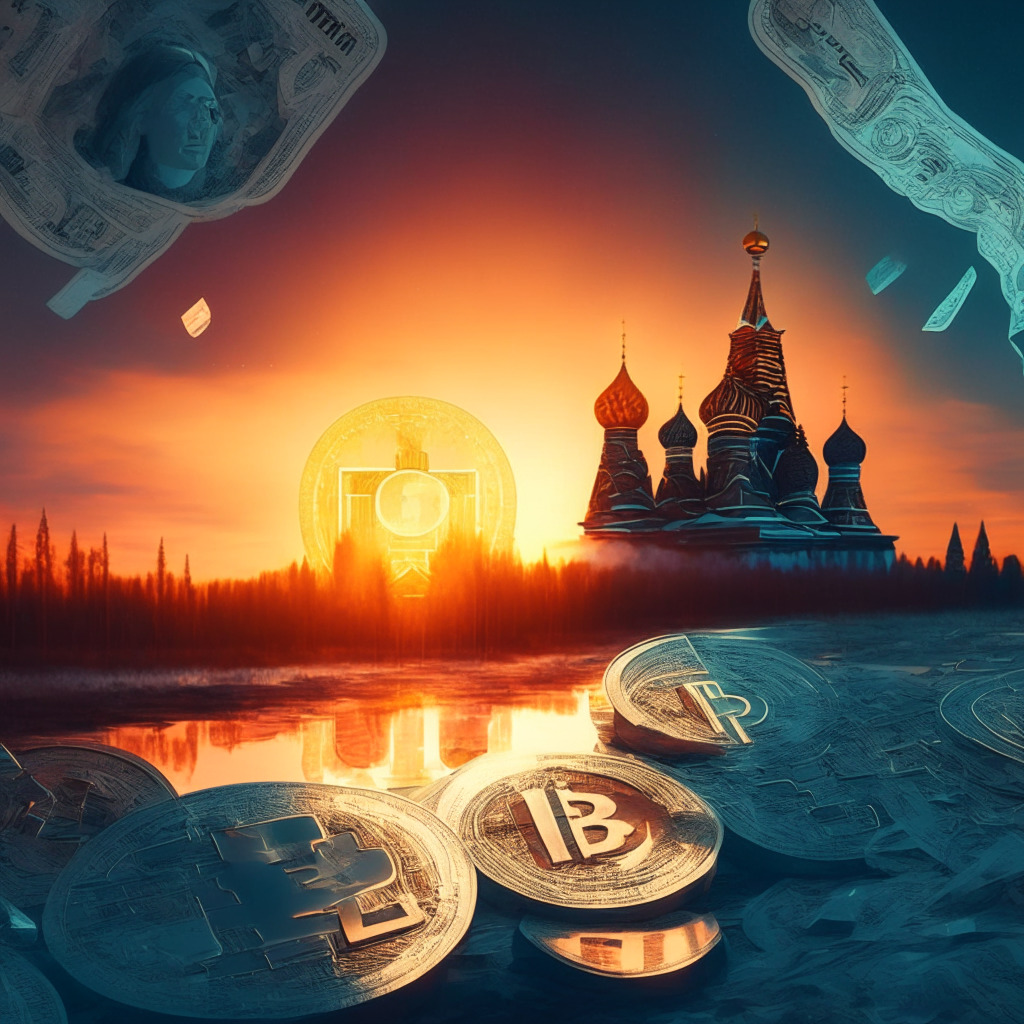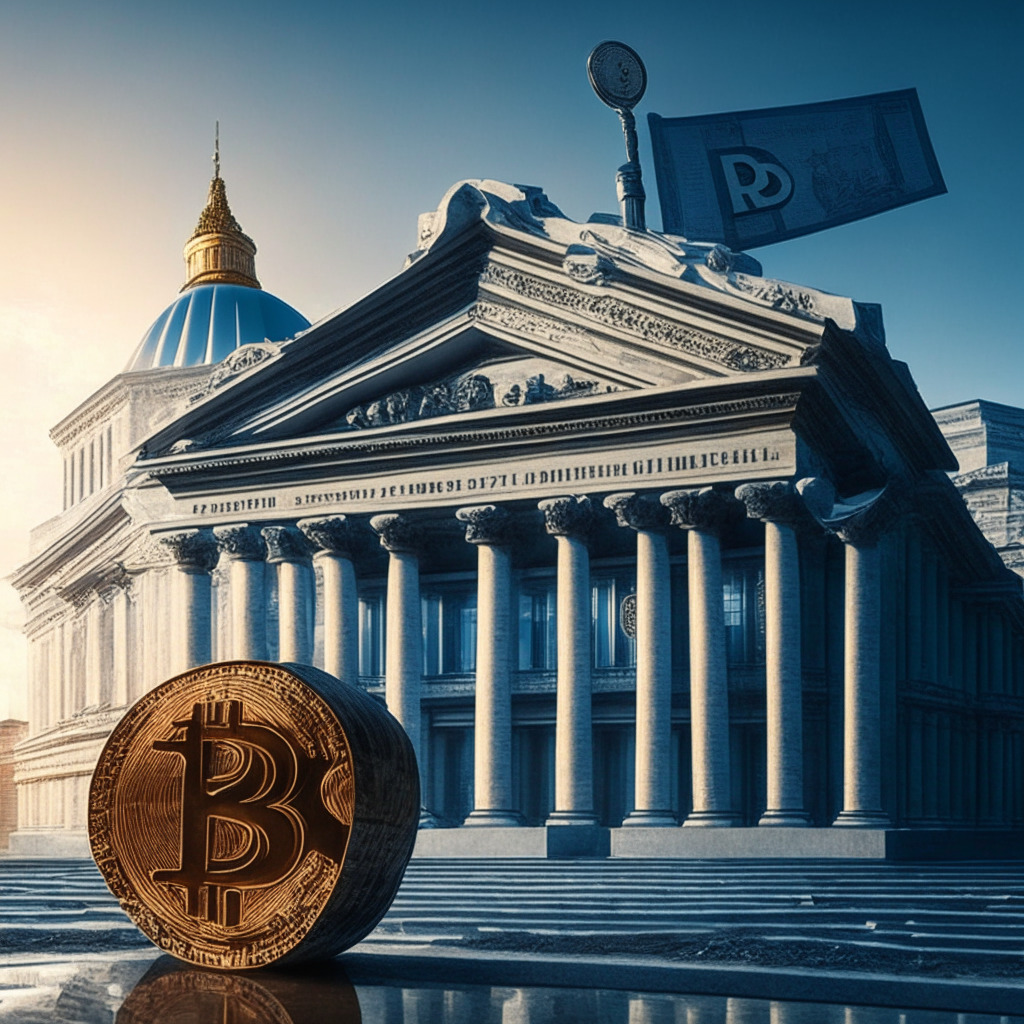Russian firms are adopting the central bank digital currency (CBDC), the digital ruble. Sirius Innovation Science and Technology Center and Rostelecom are pioneering this journey with their digital wallets, highlighting the practical application of this currency. However, this new model poses challenges for traditional financial institutions, and concerns remain about security and potential economic disruption.
Search Results for: Russian President
Digital Ruble Trial: Unveiling Russian Banks’ Apprehensions and Expectations
In a climate of anticipation, Russian banks, including Sberbank and Tinkoff Bank, express apprehension towards Central Bank’s digital ruble trial. With last-minute exist from the pilot and hesitation from the Association of Banks of Russia (ASROS), questions emerge about the future of Central Bank Digital Currency (CBDC) ahead of a substantial meeting.
Potential Russian Military Coup: How It Could Impact Crypto Market Amid Ukraine Crisis
Ongoing Ukraine war and potential Russian military coup may impact global markets, including crypto. With Russia’s significant role in oil and gas, a civil war could benefit Bitcoin and altcoin prices as perceived safer assets amid uncertainty.
Groundbreaking Crypto Payments Pilot by Russian Megabank: Pros, Cons, and Main Conflicts
Russian megabank Rosbank, in partnership with B-Crypto, has launched a groundbreaking cross-border crypto payments pilot, streamlining international transactions for companies. The initiative encounters potential roadblocks, such as liquidity concerns and varying global stances on digital currency regulation, making the future of cross-border crypto payments uncertain.
Hacker Heist: Stealing Russian Crypto for Ukraine’s Cause or An Inside Job? Pros and Cons Revealed
An unnamed Bitcoin user reportedly hacked hundreds of wallets purportedly controlled by Russian security services, […]
Unveiling the Future of Bitcoin: OpenAI’s Endorsement, Putin’s Dollar Shift Concerns and Price Trends
The CEO of OpenAI, Sam Altman, praises Bitcoin for its potential to combat corruption due to its independence from government control. He and Joe Rogan express concern over US handling of cryptocurrency regulation and central bank digital currencies. Despite recent price dips, Altman and Rogan remain hopeful for Bitcoin’s future due to its limited supply and decentralized mining. However, they caution that like all investments, cryptocurrencies are volatile and risky and require careful research and strategy.
Binance’s Existential Crisis: Will the Crypto Giant Exit Russia Amidst Growing Legal Woes?
“Binance, the leading crypto exchange, is considering an absolute exit from Russia amid increasing Western sanctions. This comes after allegations of enabling transactions related to sanctioned Russian banks, escalating global legal issues, and potential indictments for possible infringement of anti-money laundering laws.”
Russia’s Push to Confiscate & Liquidate Criminals’ Crypto: Challenges and Potential Impact
The Russian Prosecutor-General’s office is working on a proposal to confiscate and liquidate criminals’ cryptocurrency holdings. Challenges like converting tokens to fiat currency and impact on innocent crypto holders must be considered for a balanced regulatory approach.
Russia’s Shift Towards Private Crypto Exchanges: Examining Implications, Benefits, and Drawbacks
Russia abandons plans for a government-operated cryptocurrency exchange, opting instead to create regulations allowing the private sector to manage exchanges. This reflects the contradictory relationship autocratic governments have with decentralized digital assets while highlighting the inevitability of cryptocurrency adoption and the need for effective regulations.
Iran’s Move to Join BRICS: Opportunities, Challenges, and Global Power Shift Dynamics
Iran’s move to join BRICS and create a multipolar world presents opportunities and challenges for global financial markets, digital currencies, and blockchain adoption. This shift signifies changing global power dynamics and pushes towards a more balanced and inclusive world order.
Debt Default Fears & De-Dollarization: Russia’s Stance on the Shaky US Economy
Russia closely monitors the US economy amid debt default concerns and warnings by Treasury Secretary Janet Yellen. The ongoing crisis highlights economic system weaknesses, prompting countries like Russia to explore alternate solutions such as de-dollarization efforts and a potential common BRICS currency.
AI Jailbreak Fiasco: Coinbase Exec Unlocks Crypto Price Predictions, Humorous Apocalyptic Scenarios, and Alien Cover-Ups
Coinbase executive Conor Grogan recently took to Twitter to share a breakthrough he claims to […]
Diving into Russia’s Digital Ruble Debate: Opportunity or Devastating Risk?
“Russia’s active consideration of a Central Bank Digital Currency (CBDC) is encountering challenges including potential rate increases and withdrawal of major backers. Despite concerns, observers remind that cautious innovation is needed as the future of money moves increasingly towards digitization.”
Navigating Regulatory Waves: Analyzing the Impact of Recent Staff Exits at Binance
Binance, a reputable cryptocurrency exchange, bids farewell to high-ranking executives amidst talks of a potential Russian exit. This occurs amid global sanctions on Russia, and may be primarily ignited by regulatory hurdles. The implications of this upheaval extend to Binance’s operations in Russia, amounting to a significant 6.3% of total visits to Binance.com. This transition underscores the need for careful navigation of regulatory landscapes for successful crypto exchanges.
The Emerging Digital Ruble: Potential Transformation in Russia’s Banking Landscape
Anatoly Aksakov, head of Russia’s State Duma financial committee, predicts a reduced role for traditional banks as the Central Bank Digital Currency (CBDC), the digital ruble, gains adoption. Aksakov urges banks to align their infrastructure with blockchain technology to leverage CBDC’s financial capabilities.
Binance Quietly Removes Banco de Venezuela: Blockchain Freedom Versus Economic Sanctions
Cryptocurrency exchange Binance has silently removed Banco de Venezuela from its P2P service list, mirroring U.S Treasury-imposed financial sanctions. The move raises concerns among Venezuelan crypto enthusiasts, notably because the bank plays a crucial role in Venezuela’s digital currency ecosystem. Despite the silent removal, users can reportedly circumnavigate the ban due to the P2P nature of the services.
Navigating Blockchain: Innovations, Challenges, and the Intriguing Future of Cryptocurrency
“A telling report by Glassnode indicates that long-term crypto holders are showing tenacity, with Coinbase and Binance creating waves in the sector. Coinbase launched its Ethereum layer-2 blockchain, whereas Binance became the first fully licensed crypto exchange in El Salvador.”
Belarus Takes Steps Toward Central Bank Digital Currency Amid Global Race
Belarus is following a digital revolution trend towards Central Bank Digital Currency (CBDC) initiatives, with preparations to launch a digital variant of the Belarusian ruble. This landmark project by the National Bank of the Republic of Belarus (NBRB) indicates potential for cross-border payments and compatibility with other global CBDCs.
Unveiling the Digital Ruble: Russia’s Leap into Blockchain Future and Its Implications
“The Bank of Russia advances its central bank digital currency (CBDC), unveiling the logo of its digital ruble. This indicates the undeniable influence of blockchain technology on financial systems. Still, challenges appear since CBDCs have the potential to disrupt traditional banking systems. The introduction of commission fees and slow mass adoption are some stumbling blocks.”
Global Ripple Effect of Crypto Regulations: Innovation versus Protection
The article focuses on recent developments related to crypto legislation, controversy surrounding Worldcoin’s data collection practices, Russia’s progress with a central bank digital currency, and Binance retracting its crypto custody license application in Germany. The central issue revolves around the challenge of balancing innovation and public protection in international blockchain regulation.
Regulating the Digital Ruble: Russia’s Bold Leap into Digitized Sovereign Assets
“The Russian Federal Bailiff Service can now seize digital rubles from citizens and collect fines in digital currency. This forecasts a future where citizens can pay debts directly from their digital wallets linked to Central Bank Digital Currencies (CBDCs), possibly even having their wallets frozen if convicted of crimes or debt negligence. Further, this may lead to cross-national digital currency ecosystems, offering transformative potential yet posing regulatory challenges and questions about personal financial freedom.”
Rising Digital Ruble: A Boon for Entrepreneurs or a Privacy Nightmare?
“Russia’s financial landscape is shifting with the advent of the Central Bank Digital Currency (CBDC). Touted for its potential savings in transaction fees for businesses and enabling new services and technologies, it’s set to create substantial excitement in the entrepreneurial landscape. However, concerns have been raised over the Central Bank’s increased ability to monitor transactions, provoking privacy issues.”
Russo-Chinese Digital Currency Alliance: Pros, Cons, and The Inherent Power Tussle
Anatoly Aksakov, a Russian political figure, suggested potential compatibility between Russia and China’s Central Bank Digital Currencies (CBDCs) for international payments. With aims to use the digital ruble for global economic activities, this proposal hints at the possibility of digital currencies taking the centre stage in world trade.
The Digital Ruble Takes Center Stage: Potential Lifeline or Invasion of Financial Privacy?
“Vladimir Putin has signed the Digital Ruble Bill into law, enabling Russia’s Central Bank to launch its own digital currency. The digital Ruble, a Central Bank Digital Currency (CBDC), can serve as both a tool against international sanctions and a means of monitoring governmental expenditure on social projects. However, there are concerns it could be used to control citizens’ spending.”
Understanding the Arrival of Russia’s Digital Ruble: Hopes, Fears, and Future Possibilities
“The new law signed by President Putin introduces a digital ruble, operated by the Russian Central Bank, for money transfer and payment. This opens new possibilities and concerns alike, as the centralization draws apprehension from crypto enthusiasts who favor decentralization. Initial public response may be lukewarm, with mass adoption not anticipated before 2025 or 2027.”
Russia’s Digital Ruble: A Revolution in Finance or A Step Towards Financial Monopoly?
“Russia’s parliament is moving towards legislation for the ‘digital ruble’, their prospective Central Bank Digital Currency (CBDC). The proposed law hands power to the Bank of Russia to manage the CBDC infrastructure, issue currency, and guarantee safety. This move opens opportunities for new payment avenues and cross-border solutions, despite an initial skepticism and ban on digital assets.”
Digital Rouble: Boon for Retailers, Bane for Banks? The Debate on Russia’s Virtual Currency Saga
Russia’s parliament voted in favor of the “digital rouble” bill, moving towards a digitized financial infrastructure. While retail businesses expect profit, concerns about potential bank losses over the rapid transition to digital money have emerged. A country-wide rollout is planned for 2025-27, marking a significant point in Russia’s financial growth.
De-Dollarization Wave: Pakistan’s Yuan-Based Oil Import and Global Implications
Pakistan’s recent oil import from Russia, using China’s Yuan, showcases the growing momentum towards de-dollarization and the exploration of alternative currencies, such as Bitcoin, in international trade. This shift may impact the US dollar’s dominance and global market stability, requiring careful risk assessment.
Crypto Week Highlight: Mastercard, Elon, Tax Evaders, and Global Regulations
This crypto news roundup features Mastercard’s EVP on crypto and blockchain’s financial value, Ripple’s $1 billion expansion, and Biden’s crackdown on wealthy tax evaders. Other highlights include Binance’s rebuttal on mixed funds, Coinbase’s petition to the SEC, global crypto regulations, and ongoing vigilance against scams and cybercrimes.
AI-Generated Image Chaos: Impact on Stocks, Crypto, and the Need for Regulation
An AI-generated image depicting a false Pentagon explosion caused chaos on social media and a brief sell-off in the U.S. stock market. The incident raises concerns about unchecked AI development and highlights the importance of rigorous source verification.
Sanctions Against Binance US Investigator: Impact on Crypto Amid Russia-Ukraine Crisis
Russia expands its sanction list, including Binance U.S. Head of Investigation, BJ Kang, among 500 entities facing travel and financial restrictions. Binance is under scrutiny for reportedly generating high traffic from Russia, raising concerns over compliance with U.S. sanctions amid the ongoing Russia-Ukraine crisis.
Global Multipolarity: The Inevitable Shift in Power Dynamics and Its Implications
Vladimir Putin discussed the trend of multipolarity, emphasizing its inevitability and warning against resistance to it. He stressed the importance of Russia strengthening relationships with friendly nations and fostering international collaboration, while acknowledging concerns of potential strategic rivalries and enabling undemocratic regimes in a multipolar world.































